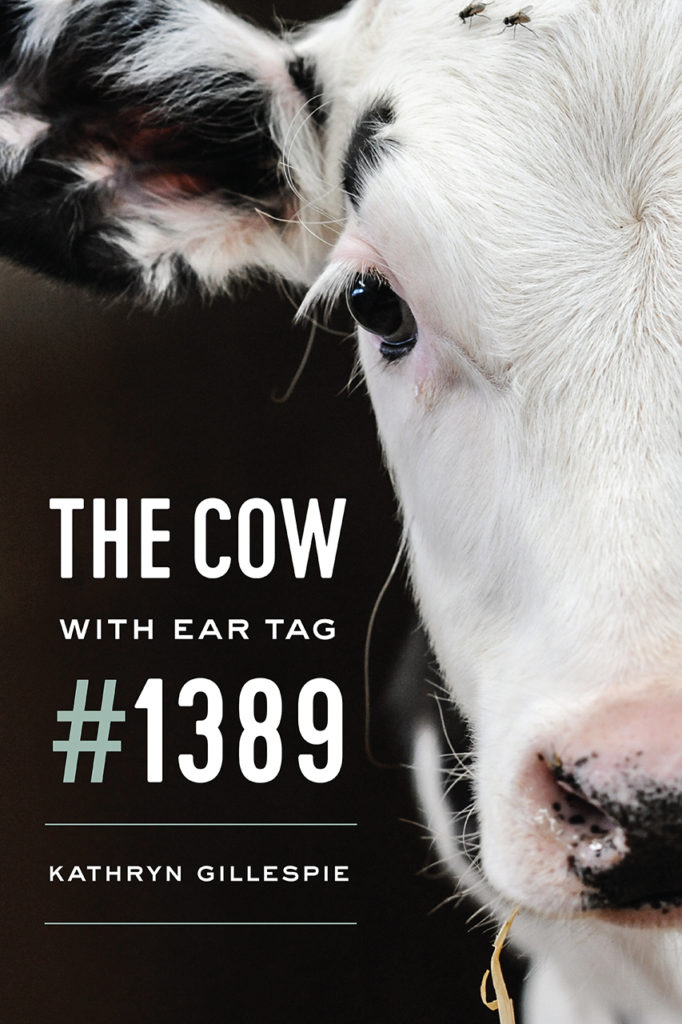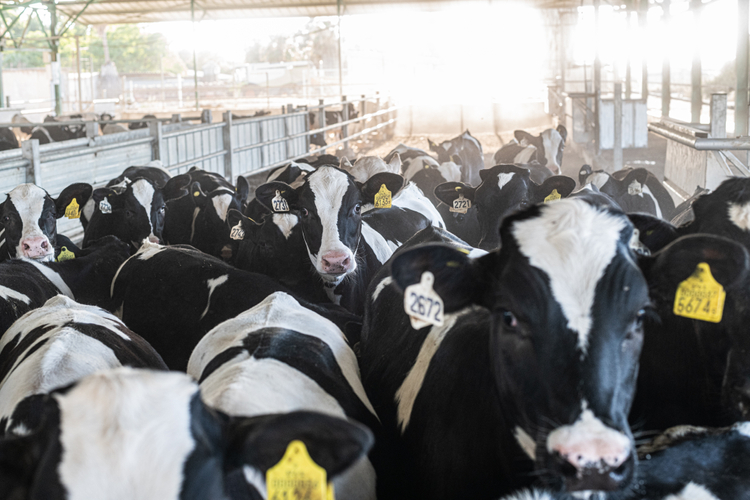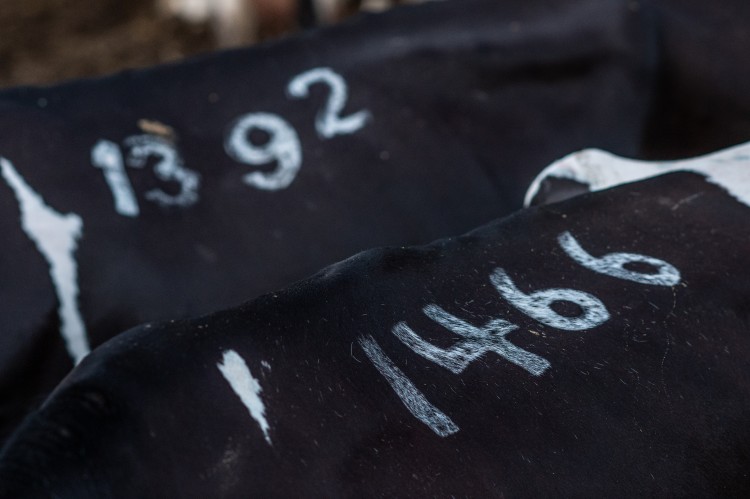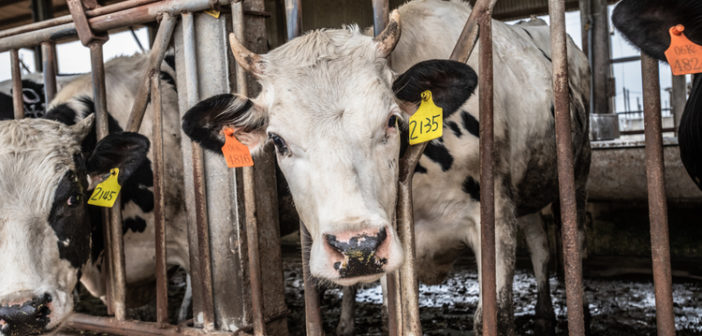
In her book The Cow with Ear Tag #1389, Kathryn Gillespie investigates what the lives of cows raised for dairy production are actually like. She visits farms, slaughterhouses, trade shows and auction yards, bringing light to the experiences of animals who are so rarely considered, making visible the structures that enable their suffering, and questioning whether dairy is really the benign enterprise we’re told it is. Gillespie walks a difficult line, never shying away from difficult topics or complex analysis, while also creating a text that is engaging to read, beautifully written, and accessible for those outside of academia.
In a conversation with Dr. Gillespie, we discussed her book, why she says that animal liberation isn’t possible within a capitalist system and veganism is not just a diet, and her thoughts on the relationship between academic work and activism.
Dylan Forest: How did you end up focusing your academic career on animals more generally, and why did you choose to focus this project specifically on dairy cows?
Dr. Kathryn Gillespie: I went to grad school planning to study food politics and the transformative possibilities of alternative-to-industrial agriculture systems. During my first quarter of grad school, I met Dr. María Elena García in the University of Washington’s Comparative History of Ideas Program. Her work on human-animal relations and food opened up a whole world of critical animal studies about which I knew nothing. I knew right away that I wanted to learn more about the use of animals for food, and I especially wanted to explore how animals are bred, raised, and killed for food in small-scale, so-called alternative methods of agriculture.
At the time, I wasn’t yet vegan, and I was a strong proponent of “humanely” raised and slaughtered animal-based foods and so wanted to direct a critical lens to my own eating practices. To this end, I focused on exploring and reconceptualizing the notion of “humane slaughter” in the United States for my Masters thesis. Through that work, I realized that there is an enormous amount of excellent scholarship on animals in the meat industry and that there was relatively little scholarship of the plight of animals raised for dairy. Wanting to interrogate my own assumptions that the production of dairy is a benign process for cows, I decided to focus my doctoral dissertation on the lives of cows in the dairy industry to illuminate this lesser explored industry. This dissertation research formed the foundation for what would later become The Cow with Ear Tag #1389.
A major focus of your book is on what happens when animals’ lives are commodified, and how capitalism transforms how we see and relate to animals. Why do you think this is an important thing to think about, rather than the more common focus on something like cruelty or welfare?
I’m interested in undoing the foundational structures or systems that make it possible – and widely acceptable – to exploit animals in the first place. Capitalism (and commodification specifically) is one of the most widespread systems that keeps intact practices that harm animals for human benefit. It’s an extractive social/political/economic system, and animals are caught up in these commodity relations in ways that routinely harm them.
There is certainly value in working against cruelty to animals and advocating for improved animal welfare in farming contexts. But this approach, without a clear commitment to undoing the underlying system itself, doesn’t necessarily change views on the acceptability (or not) of exploiting animals for human ends. Animal welfare efforts, for instance, can have the effect of further entrenching practices of animal use through convincing consumers that animals can be farmed “humanely,” when in fact animals raised for food even in conditions of the best possible animal welfare still suffer catastrophic harm.

It often feels to me like the effects of capitalism on animals aren’t foregrounded enough in vegan/animal rights discourse. Do you think efforts grounded purely in consumer behaviors (such as just buying vegan products) have the power to actually make change for animals when so much of their suffering is caused by their commodification? In other words, do you think animal liberation has to be anti-capitalist?
In short, yes. Animal liberation and capitalism cannot occur simultaneously in widespread and sustained ways. The liberation of individual animals – from farms or labs, for instance – can occur within a capitalist system. But if we’re talking about animal liberation on a large scale where nonhuman animals are no longer exploited or used by humans and are supported in lives of flourishing on their own terms, then I do not believe this is possible within a capitalist system. The very nature of capitalism is at odds with animal liberation. Capitalism, at its core, is about the accumulation of capital, and this process occurs through extracting capital from nonhuman animals in the form of their labor, reproductive processes, and bodies themselves.
Nonhuman animals have, since the birth of capitalism, been central to the success of the global capitalist system. Cows, for instance, often called “cattle” (meaning “chattel,” or property), were one of the earliest forms of capital. To liberate animals from this system entirely would mean to uproot the foundation of the system itself. Nicole Shukin’s Animal Capital, Bob Torres’s Making a Killing, and David Nibert’s Animal Oppression and Human Violence both explore the role of the nonhuman animal in capitalism much better than I am here.
And, of course, the exploitative nature of capitalism goes far beyond nonhuman animals. Humans, and marginalized human communities especially, have since the beginning of capitalism been caught up in and exploited by the imperative to concentrate wealth and capital in the hands of a few. These struggles within and against capitalist exploitation are entangled across human and nonhuman species and ecosystems.
I’m skeptical of the “vote with your dollar” approach. In the main, veganism often gets reduced to a consumer lifestyle choice, and this is understandable, given that one of the primary ways that veganism manifests is through consumption choices (e.g., to not eat or wear animals). But because capitalism is one of the primary systems that exploits animals, buying differently doesn’t change the system that creates these conditions of exploitation in the first place. Certainly, we’re seeing a shift in consumer preferences, as in the case of plant-based foods being increasingly widely available. This is great. But it doesn’t get at the underlying issue.
Veganism is not a diet, or a lifestyle choice. It’s a deeply rooted political and ethical orientation that refuses the exploitative relationships of harm humans have with other species and ecosystems, and with each other. There are very few consumer choices that can be made that don’t do harm. The vegan food justice organization Food Empowerment Project highlights this reality, for instance, in their work on farmworker rights in relation to the production of foods (like produce) that vegans consume in great quantities.
We are more than consumers – our power to change the conditions that do harm lies not in our ability to buy this or that, but in how we engage in world-making projects that manifest a different way of being in relation with others.
You don’t shy away from using the word violence to describe what animals are put through in our food system, and you note that people sometimes have a knee-jerk negative reaction to this application of the word. Why do you think it’s considered so radical to call something so obviously violent (especially when it involves bodily harm and culminates in death) violence, and why do you choose to use this word?
It has honestly been baffling to me how much resistance (even from animal studies folks!) I’ve encountered in using the term violence to describe what happens to animals in the food system. To me, it’s clear that practices like forcibly impregnating someone, separating families, and killing someone are all violent acts. A refusal to acknowledge these acts as violent when perpetrated on a member of another species signals to me a fundamental discomfort with, and avoidance of, admitting one’s complicity in this violence. I think calling something violence clearly highlights the ethical problems with participating in a practice (like eating) that perpetuates that violence. If it’s not called, or thought of, or acknowledged as, violence, then it’s more widely acceptable to continue that practice.

I would imagine that farmed animals are the animals many people least value considering or speaking up for. How has your work been received, both in academic circles and among non-academics? Was it difficult for you to find support to do this research and write this book in the first place?
I’ve met many academic and non-academic folks who’ve been supportive of this work either because they recognize the importance of centering farmed animals or because they do this kind of work themselves. I’ve found a real sense of community with others sympathetic to and dedicated to these issues. My graduate program was very supportive of my work and interests, even though there were not department-specific resources for learning about animal-related topics (e.g., classes, mentors familiar with the subject, etc.).
With this academic focus, however, finding research funding and employment has been challenging. There are many people in and beyond the academy who do not think other species (and farmed animal species in particular) are important as subjects of serious intellectual or ethical consideration. So, yes, it’s a struggle to make my way in this path, but I think this is a plight that most animal liberation activists experience – a kind of alienation and exhaustion that comes from people not recognizing the importance of the issues of justice that you’re fighting so hard for.
How do you think about academic work in the greater fight for animal liberation? Do you consider your book a form of activism, and would you recommend an academic career for people who want to make real change for animals?
Academic work, I think, does have the potential to contribute to the struggle for animal liberation. Academic scholarship and/or academics can add some credentialed backing to social movements, such as the animal liberation movement, in terms of offering research that may support the work of other activists fighting for animal liberation. My sense is that academics can and do make a difference for animals when they write accessibly for a general audience and when they have the opportunity to teach courses and/or give public talks on issues related to animal liberation. My hope with writing the book was that I could contribute to activist work for animals.
I’m ambivalent about recommending an academic career to those interested in making real change for animals. The state of the academic job market is increasingly difficult, made even more so by hiring freezes related to COVID-19. There are simply not enough stable academic jobs for the number of PhDs graduating from degree programs. For those in critical animal studies there are even fewer job prospects, and critical animal studies scholars often have to fit themselves into more conventional and widely recognized disciplines to have a shot at an academic job. If that’s the case, then there is likely a lot of work and time spent on things not related to animals – from teaching courses not reflective of these interests, to departmental and disciplinary service commitments, and so on.
In many ways, an academic career path can be a wonderful one – giving time and space to research, write, and teach about important issues that matter to you. For those who can land a permanent academic position, as a career path, it offers a real place of privilege from which to advocate for animals.
Featured image: cows on a dairy farm in Taiwan. Image credit Jo-Anne McArthur / We Animals.





